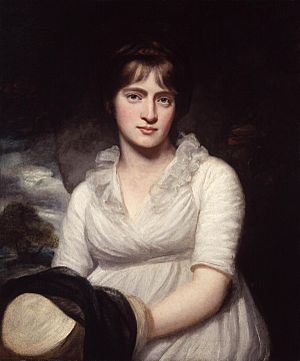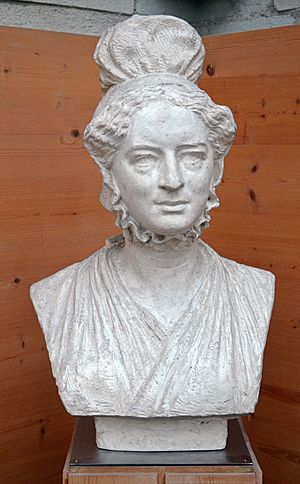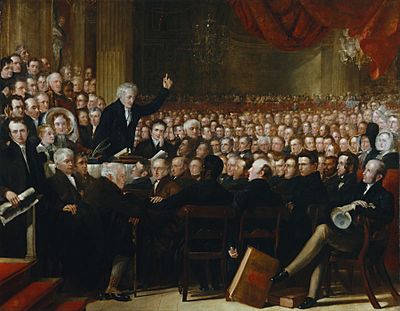Amelia Opie facts for kids
Quick facts for kids
Amelia Opie
|
|
|---|---|

A 1798 portrait of Amelia Opie by her husband, John Opie
|
|
| Born |
Amelia Alderson
12 November 1769 Norwich, England, United Kingdom
|
| Died | 2 December 1853 (aged 84) Norwich, England, United Kingdom
|
| Resting place | Gildencroft Quaker Cemetery, Norwich |
| Occupation | 18th century novelist and poet |
| Spouse(s) | John Opie (1798–1807; his death) |
Amelia Opie (born Amelia Alderson; November 12, 1769 – December 2, 1853) was an English writer. She wrote many novels and poems during the Romantic period, which was a time when art and literature focused on emotions and nature. Amelia Opie was also a very important leader in the movement to end slavery in Norwich, England. She was the first person to sign a petition from women asking the British Parliament to stop slavery. This petition had 187,000 names on it.
Contents
Who was Amelia Opie?
Amelia Alderson was born on November 12, 1769. She was the only child of James Alderson, a doctor, and Amelia Briggs. Her mother taught her to care for people who were not as lucky as she was. After her mother passed away in 1784, Amelia became her father's housekeeper. She stayed very close to him until he died in 1807.
Amelia was a lively and charming person. She loved nice clothes and was well-educated. She also had many friends who admired her. She was a cousin of the judge Edward Hall Alderson and the artist Henry Perronet Briggs. Amelia believed in strong social change and was friends with important activists like William Godwin and Mary Wollstonecraft.
Her Writing Career

When she was young, Amelia Opie enjoyed writing poems and plays. She also helped organize plays for fun. She wrote her first novel, The Dangers of Coquetry, when she was just 18 years old.
In 1801, Amelia finished her novel Father and Daughter. This book was known for showing real feelings and sadness. It was about a good person who made mistakes and how families could come back together. After this book, Amelia started publishing her works regularly. Her book of Poems, published in 1802, was so popular that it was printed six times!
Her husband encouraged her to keep writing. In 1804, she published Adeline Mowbray. This novel explored ideas about women's education, marriage, and ending slavery. It also touched on the life of her friend Mary Wollstonecraft. Mary had a relationship and later married William Godwin, which caused some talk at the time.
Amelia Opie wrote many more novels. These included Simple Tales (1806), Temper (1812), and Tales of Real Life (1813). She also published The Warrior's Return and other poems in 1808.
Fighting Against Slavery
In 1825, Amelia Opie joined the Society of Friends, also known as Quakers. She was influenced by her friends and neighbors, Joseph John Gurney and his sisters. Even though her father had not wanted her to join, she did after he passed away. For the rest of her life, Amelia spent a lot of time traveling and helping charities.
She continued to write about important issues. In 1826, she published an anti-slavery poem called The Black Man's Lament. She also wrote a book of religious poems called Lays for the Dead in 1834.
Amelia Opie worked with Anna Gurney to start a Ladies Anti-Slavery Society in Norwich. This group organized a huge petition with 187,000 names. This petition was given to the British Parliament to ask for an end to slavery. Amelia Opie and Priscilla Buxton were the first two names on this important document.
In 1840, Amelia Opie went to the World Anti-Slavery Convention in London. She was one of the few women included in the special painting made to remember the event.
Her Personal Life
In 1798, Amelia married John Opie, who was a painter. They met at a party in Norwich. They lived together happily for nine years until John Opie passed away in 1807. Amelia then split her time between London and Norwich.
She was friends with many famous writers, including Walter Scott, Richard Brinsley Sheridan, and Germaine de Staël. Even when she was older, Amelia stayed connected with writers. She even hosted George Borrow as a guest.
Amelia Opie died on December 2, 1853, in Norwich. She was 84 years old. She was buried at the Gildencroft Quaker Cemetery, Norwich. People said she was lively and cheerful right up until the end of her life.
Selected Works
Amelia Opie wrote many books and poems. Here are some of her notable works:
- Novels and stories
- Dangers of Coquetry (1790)
- The Father and Daughter (1801)
- Adeline Mowbray (1804)
- Simple Tales (1806)
- Temper; or, Domestic Scenes (1812)
- Tales of Real Life (1813)
- Valentine's Eve (1816)
- New Tales (1818)
- Tales of the Heart (1820)
- Madeline, A Tale (1822)
- Illustrations of Lying (1824)
- Tales of the Pemberton Family for Children (1825)
- Detraction Displayed (1828)
- Biographies
- Memoir of John Opie (1809)
- Poetry
- Poems (1802)
- The Warrior's Return and other poems (1808)
- The Black Man's Lament (1826) (You can read it here)
- Lays for the Dead (1834)
Images for kids
See also
 In Spanish: Amelia Opie para niños
In Spanish: Amelia Opie para niños
 | Kyle Baker |
 | Joseph Yoakum |
 | Laura Wheeler Waring |
 | Henry Ossawa Tanner |



